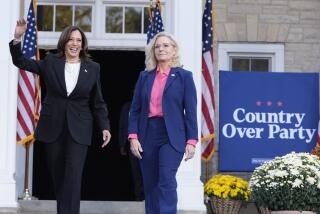Cheney Unrelenting on War Policy
- Share via
NEW ORLEANS — Returning to the controversy about Saddam Hussein’s links with Al Qaeda terrorists, Vice President Dick Cheney on Thursday repeated his assertion that “long-established ties” existed between the former Iraqi dictator and the terrorist network.
Speaking hours after Hussein’s appearance in a Baghdad courtroom on charges of mass killings and other crimes against humanity, Cheney offered a broad assessment of the Bush administration’s fight against terrorism, saying that President Bush had made the world safer by taking “relentless action” and launching “a broad and sustained war on terrorist networks around the globe.”
Cheney, addressing Republican supporters at the National D-Day Museum, also leveled implicit criticism at Bush’s predecessor, former President Clinton.
“Consider for a moment how matters stood at the time when President Bush and I were sworn into office on Jan. 20th, 2001,” he said. “Terrorists were on the offensive around the world, emboldened by many years of unanswered attacks. Repeatedly, they had struck America with little cost or consequence.”
The speech underscored renewed efforts by the White House to rebuild support for its Iraq policies amid continuing violence in that country and the handover this week of sovereignty to an interim government.
Recent polls have indicated that the American public is growing increasingly concerned about U.S. casualties in Iraq and uncertain that the war was worth the cost.
In his remarks, Cheney returned to a debate over the nature of the links between Hussein’s regime and Al Qaeda.
The debate is significant because of the rationale the Bush administration laid out for attacking Iraq and forcing Hussein from power. Bush said before the war that Hussein “aids and protects terrorists, including members of Al Qaeda,” and that Hussein could slip catastrophic weapons to terrorists.
Two weeks ago, the staff of the independent commission investigating the Sept. 11 attacks issued a report that downplayed the significance of Iraqi ties to Al Qaeda. Although the report cited multiple contacts between Iraqi officers and Osama bin Laden’s terrorist group, it said those contacts did not “appear to have resulted in a collaborative relationship.”
When the report was released, Massachusetts Sen. John F. Kerry, all but certain to be the Democrats’ nominee to face Bush this fall, said the president had “misled” the country and owed “the American people a fundamental explanation.”
But Cheney on Thursday repeated his assertions of high-level ties between Iraq and terrorists, including members of Al Qaeda. “These ties included senior-level contacts going back a decade,” he said.
Cheney said Hussein had sent a brigadier general from the Iraqi intelligence service to Sudan in the early 1990s to train Al Qaeda in bomb-making and document forgery.
He also said Iraq gave sanctuary to one of the 1993 World Trade Center bombers and, later, to terrorist mastermind Abu Musab Zarqawi, whom he described as a “senior Al Qaeda associate.”
Previous comments by Cheney about the brigadier general, as well as comments on other elements of the Iraq-Al Qaeda ties, prompted the chairman and vice chairman of the Sept. 11 commission two weeks ago to urge the vice president to turn over any additional information that the panel did not have.
Al Felzenberg, spokesman for the Sept. 11 commission, would not comment Thursday on whether the White House had provided the panel’s staff with any new information since then. But he said the staff had not reviewed any new material that had led it to revise its findings.
“We believe we have seen all the information the vice president has seen, and stand by the staff statement released at the last hearing,” Felzenberg said.
A senior administration official said that much of the information Cheney discussed Thursday had been included in a letter that CIA Director George J. Tenet sent to the Senate Intelligence Committee in 2002. It was unclear whether that letter was the source of Cheney’s information about the Iraqi brigadier general.
Zarqawi, a Jordanian-born militant, and his supporters have been blamed for much violence in Iraq, including the coordinated attacks on police and security forces last week that killed more than 100 people, as well as the beheading of an American and a South Korean hostage.
Cheney said Zarqawi had taken sanctuary in Baghdad after coalition forces drove him from Afghanistan, and that “the Iraqi regime refused to turn over Zarqawi even when twice being provided with detailed information on his presence” there.
Terrorism experts have differed on whether Zarqawi is affiliated with Al Qaeda or whether he runs his own terrorist network. Some say he was far more closely tied to opposition groups in Iraq such as Ansar al Islam, a largely Kurdish radical group, than to Hussein.
Responding to Cheney’s speech, the Kerry campaign said the Bush administration had made “exaggerations” as it laid out its case for war in Iraq.
“The American people are losing confidence in the president’s handling of the war on terror, and the Bush campaign is running scared,” said Phil Singer, a Kerry campaign spokesman.
More to Read
Get the L.A. Times Politics newsletter
Deeply reported insights into legislation, politics and policy from Sacramento, Washington and beyond. In your inbox twice per week.
You may occasionally receive promotional content from the Los Angeles Times.










